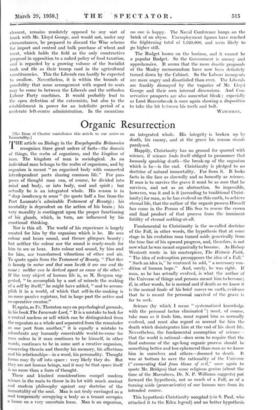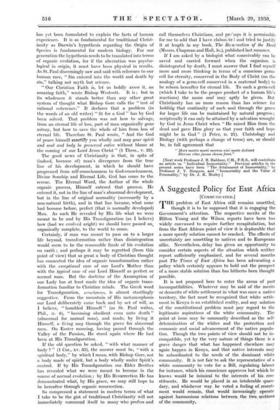Organic Resurrection
[The Dean of Chester contributes this article to our series on
Immortality.]
THE article on Biology in the Encyclopcedia Britannica recognizes three great orders of facts—the domain of things, the realm of organisms, and the kingdom of man. The kingdom of man is sociological. As an individual man belongs to the realm of organisms, and by organism is meant " an organized body with connected interdependent parts sharing common life." For pur- poses of thought man can, of course, be divided into mind and body, or into body, soul and spirit ; but actually he is an integrated whole. His reason is in " deep insolvency to sense" (to quote half a line from the Poet Laureate's admirable Testament of Beauty); his mentality is dependent on the action of his brain ; his very morality is contingent upon the proper functioning of his glands, which, in turn, are influenced by his emotional thinking.
Nor is this all. The world of his experience is largely created for him by the organism which is he. He sees colour and hears sound, and thence glimpses beauty ; but neither the colour nor the sound is ready-made for him to see or hear. Into colour and sound, by him and for him, are transformed vibrations of ether and air.
To quote again from the Testament of Beauty, " That ther is beauty in natur and that man toveth it are one and the same ; neither can be derived apart as cause of the other."
If the very object of human life is, as M. Bergson sug- gested, " to accomplish by a sort of miracle the making of a self by itself," he might have added, " and to accom- plish it in a world, of which that self-in-the-making is no mere passive registrar, but in large part the active and co-operative creator."
If, again, as Fr. Thornton says on psychological grounds, in his book The Incarnate Lord, " It is a mistake to look for a central nucleus or self which can be distinguished from the organism as a whole and separated from the remainder as one part from another," it is equally a mistake to adumbrate any humanly conceivable world-to-come for man unless in it man continues to be himself, in other words, continues to be in some sort a creative 'organism, conserving therein and thereby his memory, his affections and his relationships—in a word, his personality. Thought forms may fly off into space : very likely they .do. But they are not human beings, and it may be that space itself is no more than a form of thought.
These and kindred eonsiderations compel modern science in the main to throw in its lot with much ancient and' modern philosophy against any doctrine of the immortality the soul. Man is not truly envisaged as a soul teniporarily occupying a body as a tenant occupies a house on a very uncertain lease. Man is an organism, an integrated whole. His integrity is broken up by death, his enemy, and at the grave his reason stands paralysed.
Happily, Christianity has no ground for quarrel with science, if science finds itself obliged to pronounce that humanly speaking death—the break-up of the organism which is he—is the end. Christianity is pledged to no doctrine of natural immortality. Far from it. It looks facts in the face as shrewdly and as honestly as science. If man is to survive the grave it must be as man that he survives, and not as an abstraction. So impossible, however, was it and is it (according to traditional Christ- ianity) for man, as he has evolved on this earth, to achieve eternal life, that the author of the organic process Himself has come in the Person of His Son to rescue the crown and final product of that process from the imminent futility of eternal nothing-at-all.
Fundamental to Christianity is the so-called doctrine of the Fall, in other words, the hypothesis that at some stage in his evolution man turned aside generically from the true line of his upward progress, and, therefore, is not now what he was meant organically to become. As Bishop Westcott wrote in his masterpiece, The Historic Faith, " The idea of redemption presupposes the idea of a Fall." " Such an idea is," he ventured to add, " a necessary con- dition of human hope." And, surely, he was right. If man, as he has actually evolved, is what the author of the Universe of things and persons meant him to become; if, in other words, he is normal and if death as we know it is the normal finale of his brief career on earth, evidence that he is meant for personal survival of the grave is far to seek.
Science (by which I mean " systematized knowledge with the personal factor eliminated ") must, of course, take man as it finds him, must regard him as normally evolved, and must also regard as normal for him the death which disintegrates him at the end of his short life. Nevertheless, the fundamental assumption of science— that the world is rational—does seem to require that the final outcome of the age-long organic process should be something better and less ephemeral than man as we know him in ourselves and others—doomed to death. It was at bottom to save the rationality of the Universe (" exonerating God from blame of evil," once again to quote Mr. Bridges) that some religious genius (about the time of the Maccabees, Dr. N. P. Williams suggests) put forward the hypothesis, not so much of a Fall, as of a turning aside (praevaricatio) of our human race from its intended course.
This hypothesis Christianity accepted (via S. Paul, who attached it to the Eden legend) and no better hypothesis has yet been formulated to explain the facts of human experience. It is as fundamental for traditional Christ- ianity as Darwin's hypothesis regarding the Origin of Species is fundamental for modern biology. For our generation the hypothesis needs to be translated into terms of organic evolution, for if the aberration was psycho- logical in origin, it must have been physical in results. As St. Paul discerningly saw and said with reference to our human race, " Sin entered into the world and death by sin," talking not myth but science.
" Our Christian Faith is, let us boldly avow it, an amazing faith," wrote Bishop Westcott. It is ; but in its wholeness it stands better than any other great system of thought what Bishop Gore calls the " test of rational coherence." It declares that a problem (in the words of an old writer) " fit for a God " has by God been solved. That problem was not how to salvage, from an eternal life of loss, part of man organically gone astray, but how to save the whole of him from loss of eternal life. Therefore St. Paul wrote, " And the God of peace himself sanctify you wholly and may your spirit and soul and body be preserved entire without blame at the coming of our Lord Jesus Christ " (1 Thess., v. 23).
The good news of Christianity is that, in spite of (indeed, because of) man's divergence from the true line of his development, in which he should have progressed from self-consciousness to God-consciousness, Divine Sonship and Eternal Life, God has come to the rescue. The Eternal Word, the Author of the whole organic process, Himself entered that process. He entered it, not in the line of man's abnormal development, but in the line of original normality (necessarily by' a non-natural birth), and in that line became, what none had become before, perfect (that is normally developed) Man. As such He revealed by His life what we were meant to be and by His Transfiguration (as I believe) how (had we evolved aright) we should have passed on organically complete, to the world to -come.
Certainly, if man was meant to pass on to a larger life beyond, transformation rather than disintegration would seem to be the reasonable finale of his evolution on earth ; and perhaps it may be regretted (from this point of view) that so great a body of Christian thought has connected the idea of organic transformation rather with the exceptional case of our Lord's Mother than with the typical case of our Lord Himself as perfect or normal man. But the doctrine of the Assumption of our Lady has at least made the idea of organic trans- formation familiar to Christian minds. The Greek word for Transfiguration, peraAtf Owns, is almost startlingly suggestive. From the mountain of His metamorphosis our Lord deliberately came back and by act of will, as I believe, " humbled Himself " (as St. Paul writes, Phil., . Ii. 8), " becoming obedient even unto death " (abnormal for normal man), and made, by living it Himself, a living way through the grave for abnormal men. On Easter morning, having passed through the Valley of the Passion, He stood again where He had been at His Transfiguration.
If the old question be asked, " with what manner of body ? " (1 Cor., xv. 35), the answer must be, "with a spiritual body," by which I mean, with Bishop Gore, not a body made of spirit, but a body wholly under Spirit's control. If by His Transfiguration our. Elder Brother has revealed what we were meant to become in the course of normal evolution.; by His Resurrection He has demonstrated what, by His grace, we may still hope to be hereafter through organic resurrection.
So compressed 9. statement in modern terms of . what I take to be the gist of traditional Christianity will not immediately commend itself to many who profess and call themselves Christians, and per'iaps it is permissible for me to add that I have elaborae 1 and tried to justify it at length in my book, The Resurrection of the Dead (Messrs. Chapman and Hall, 5s.), published last summer.
If I am asked by a biologist what conceivably can be saved and carried forward when the organism is disintegrated by death, I must answer that I find myself more and more thinking in terms of a conscious germ- cell for eternity, conserved in the Body of Christ (on the analogy of a germ-cell conserved in a maternal body) to be reborn hereafter for eternal life. To such a germ-cell (which I take to be the proper product of a human life's reactions) the name soul may aptly be given. But Christianity has no more reason than has science for holdirig that continuity of such soul through the grave for larger life can be maintained by natural progress ; scripturally it can only be attained by a salvation wrought by God in Jesus Christ when " He raised Him from the dead and gave Him glory so that your faith and hope might be in God " (1 Peter, ii. 21). Christology and Biology (with perhaps a change of tense) are, or should be, in full agreement that Mors mortis tnorti mortem niai mark dedieset Eternae vitae janua datum ford."
[Next week Professor J. B. Haldane, C.H., F.R.S., will contribute an article on " Individual Immortality." Previouit articles in the present series have been " The Attainment of Immortality," by Professor J. Y. Simpson, and. " Immortality and the Value of Personality," by Dr. J. K. Mozley.]















































 Previous page
Previous page